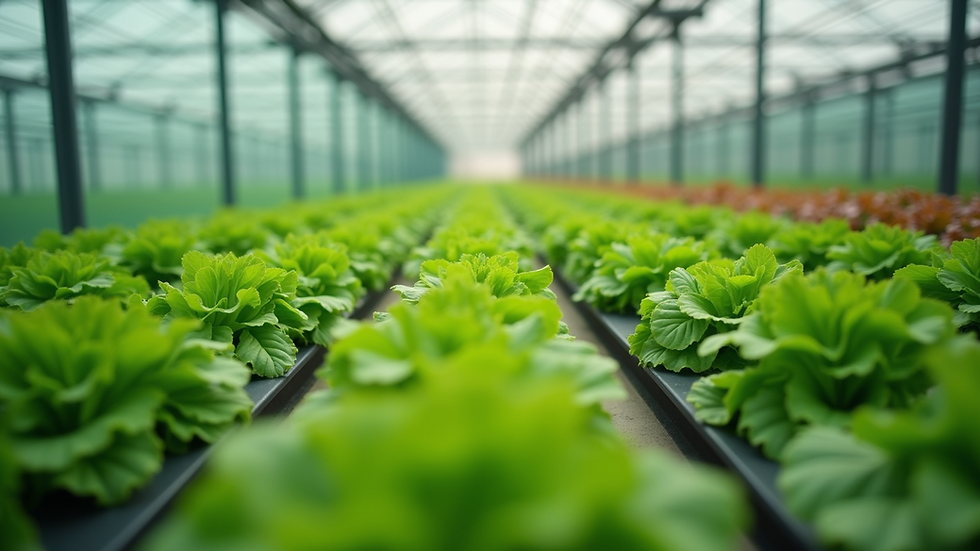Why Microgreens Are a Superfood for Your Diet
- Matthew Bowser
- Aug 25, 2025
- 4 min read
Microgreens have taken the health world by storm, and for good reason. These tiny, young vegetable greens pack a powerful nutritional punch that can elevate your diet in many ways. Whether you’re a seasoned health enthusiast or just starting to explore better eating habits, understanding the microgreens benefits can inspire you to add these vibrant greens to your meals.
What Are Microgreens and Their Microgreens Benefits?
Microgreens are young seedlings of edible vegetables and herbs harvested just after the first leaves have developed. They are typically 1 to 3 inches tall and come in a variety of flavors, colors, and textures. Unlike sprouts, microgreens grow in soil or a soil substitute and require sunlight, which helps them develop more nutrients.
Nutritional Powerhouse
One of the most compelling microgreens benefits is their dense nutrient content. Studies show that microgreens can contain up to 40 times more vitamins and antioxidants than their mature counterparts. For example, red cabbage microgreens have been found to have significantly higher levels of vitamin C and vitamin E compared to fully grown red cabbage.
Easy to Incorporate
Microgreens are incredibly versatile. You can sprinkle them on salads, sandwiches, soups, and even smoothies. Their fresh, crisp texture and intense flavor add a gourmet touch to everyday meals without much effort.
Sustainable and Convenient
Growing microgreens at home is simple and requires minimal space and resources. This makes them an excellent choice for urban dwellers or anyone interested in sustainable eating. Plus, they grow quickly, often ready to harvest in just 7 to 14 days.

The Science Behind Microgreens Benefits
Microgreens are not just trendy; their health benefits are backed by science. Researchers have analyzed various microgreens and found that they are rich in essential nutrients such as:
Vitamins C, E, and K
Beta-carotene
Lutein and zeaxanthin
Polyphenols and flavonoids
These compounds contribute to improved immune function, eye health, and reduced inflammation.
Antioxidant Content
Microgreens are particularly noted for their antioxidant properties. Antioxidants help neutralize harmful free radicals in the body, which can reduce the risk of chronic diseases such as heart disease, diabetes, and cancer. Including antioxidant rich vegetables like microgreens in your diet can be a proactive step toward better health.
Supporting Heart Health
Certain microgreens, such as sunflower and pea shoots, contain compounds that may help lower bad cholesterol levels and improve blood pressure. This makes them a heart-friendly addition to your meals.

What Food Is the Most Powerful Antioxidant?
When it comes to antioxidants, some foods stand out more than others. While microgreens are incredibly rich in antioxidants, other foods like berries, dark chocolate, and certain nuts also rank high.
Comparing Antioxidant Levels
Blueberries are famous for their high antioxidant content, particularly anthocyanins.
Dark chocolate contains flavonoids that support heart health.
Kale and spinach microgreens have been shown to have higher antioxidant levels than their mature forms.
Among microgreens, red cabbage and cilantro microgreens are often cited as some of the most potent antioxidant sources. Their concentrated nutrients make them a powerful ally in fighting oxidative stress.
How to Maximize Antioxidant Intake
To get the most antioxidants from your diet, consider:
Eating a variety of colorful fruits and vegetables.
Including microgreens regularly as a nutrient-dense topping.
Avoiding overcooking vegetables, which can reduce antioxidant levels.

How to Add Microgreens to Your Daily Diet
Incorporating microgreens into your meals is easy and enjoyable. Here are some practical tips:
Salads: Toss a handful of microgreens into your favorite salad for extra crunch and flavor.
Sandwiches and Wraps: Use microgreens as a fresh layer instead of lettuce.
Smoothies: Blend mild-flavored microgreens like spinach or pea shoots into your morning smoothie.
Soups and Garnishes: Sprinkle microgreens on top of soups or main dishes just before serving.
Egg Dishes: Add microgreens to omelets or scrambled eggs for a nutrient boost.
Growing Your Own Microgreens
If you want to ensure freshness and save money, growing microgreens at home is a great option. You only need:
A shallow tray or container
Quality soil or a growing medium
Seeds specifically for microgreens (such as radish, broccoli, or basil)
Water and sunlight
Within two weeks, you can harvest your own microgreens and enjoy their benefits daily.
Why Microgreens Are a Smart Choice for Health and Flavor
Microgreens are more than just a trendy garnish. Their concentrated nutrients, ease of use, and ability to enhance the taste and appearance of meals make them a smart choice for anyone looking to improve their diet.
Summary of Key Benefits
Nutrient-dense: Packed with vitamins, minerals, and antioxidants.
Flavorful: Adds fresh, intense flavors to dishes.
Convenient: Quick to grow and easy to use.
Versatile: Suitable for many types of meals.
Supports health: May reduce risk of chronic diseases.
By including microgreens in your diet, you are investing in your long-term health while enjoying delicious food.

Embracing Microgreens for a Healthier Lifestyle
Adding microgreens to your diet is a simple yet effective way to boost your nutrient intake. Whether you buy them from a local market or grow them yourself, these tiny greens offer big benefits. Start small by adding microgreens to one meal a day and notice the difference in flavor and vitality.
Explore the world of microgreens and discover how these superfoods can transform your eating habits and support your well-being.






Comments